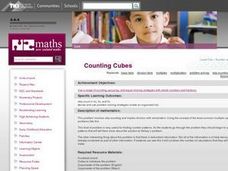Curated OER
Counting Cubes
Students count backwards in 2s from 30 then try other skip patterns such as 1,3,5, etc. and invent their own counting patterns. They are introduced to the problem using a pile of cubes and count by 2s and have a remainder.
Curated OER
Leaves, Flowers, Seashells, Mirrors and Symmetry
Students develop an understanding of patterns and symmetry. In this symmetry and pattern lesson, students use real world patterns then analyze and extend them. Students also use real world items while discovering and observing...
Curated OER
Team Puzzles
Fourth graders work in co-operative teams of four to complete a puzzle. Each student initially works independently, and then the team jointly puts together the four shapes they have individually made, to complete the puzzle.
Curated OER
Legs in the Barn
Pupils listen to the problem being read. They then brainstorm possible approaches and are encouraged to plan ways of recording their work so that others examine what they have done and share their findings.
Curated OER
Wings and Othe Things
Learners work in groups that are engaged in different activities at different times. They watch the video "Madagascar" and collect data pertaining to the Fish Eagle's arm spam. They work together to perform mathematical computations...
Curated OER
students rotate through four workstations that reinforce the concept of symmetry
Second graders, in pairs, use arrays to explore the relationship between multiplication and division.
Curated OER
Using Tens Frames for the Strategy of Bridging to Ten
Second graders are given a problem. They are shown a fixed frame of 9 and students are asked to say where the six more should go without touching the tens frame. Students are invited to answer the question and show go they got the answer.
Curated OER
Beetle Wheels
Second graders link the development of skip-counting patterns to bars on a relationship graph. They also plot our skip-counting patterns on a hundred's board, counting by 2's and also by 4's.
Curated OER
Coin Exchange
Second graders explore the concept of money and simple arithmetic. They represent a sum of money using various combinations of coins and devise and use problem solving strategies to explore mathematical situations.
Curated OER
Gulls
Young scholars listen to the problem and think about the first question and the number operation that they would use and explain. They work in pairs and record their solutions so that they can be displayed and shared.
Better Lesson
Better Lesson: Compare Parts of a Whole
Given a set of fractions students will be able to compare unit fractions by using models to determine that the more equal parts there are in the whole, the smaller each part will be. This lesson includes a detailed plan, samples of...
Better Lesson
Better Lesson: A Whole and Its Parts
Second graders take fractions apart and put them back together to form a whole.
Better Lesson
Better Lesson: Adding and Subtracting Fractions
Understanding that when the total number of parts of a whole are the same, fractions can be added.
Better Lesson
Better Lesson: North of the Dungeon
Using castles and treasure maps, 2nd graders will learn how fractions are parts of a whole.
Alabama Learning Exchange
Alex: Understanding Fractions
In this lesson the children will demonstrate parts of a whole using a candy bar (or fruit), and piece of paper. The activities are used as instructional plans to help students better understand shapes and parts of a shape up to a whole....
PBS
Pbs Learning Media: Math + Arts: Musical Fractions
In this lesson, students will explore fractions through rhythmic sequences. Media sources and teaching materials are included.
Better Lesson
Better Lesson: I Would Like to Be a Part of the Group!
Fourth graders will work in teams to discover how to read and write fractions that name a part of a group. The lesson will use a fraction pad so students can see how a number names a part of a whole or a part of a group. This website...
Alabama Learning Exchange
Alex: "Fantastic Fractions"
The students will use sugar-free Gummy bears to identify fractional parts of the whole. The students will create a graph using the information obtain.This lesson plan was created as a result of the Girls Engaged in Math and Science...
Illustrative Mathematics
Illustrative Mathematics: Mixed Numbers With Unlike Denominators
The purpose of this task is to help students realize there are different ways to add mixed numbers and is most appropriate for use in an instructional setting. The two primary ways one can expect students to add are converting the mixed...
Better Lesson
Better Lesson: Where Would It Be?
A lesson to help conceptualize fractions as numbers. Students work to see fractions as a part of a whole and a length.
Alabama Learning Exchange
Alex: Fraction Fun
The students will participate in a hands-on lesson about dividing a whole object into parts. They will also practice simple addition.This lesson plan was created as a result of the Girls Engaged in Math and Science University, GEMS-U...
National Council of Teachers of Mathematics
The Math Forum: Intro to Fractions for Primary Students
This site from the Math Forum is a series of lesson plans with great ideas and an excellent Web site that uses virtual manipulatives with students.
University of Texas at Austin
Mathematics Teks Toolkit: To Be (Half) or Not to Be (Half)
Explore part to whole and part of a set with interlocking cubes.
Other popular searches
- Fractions Parts and Wholes
- Whole Part Fractions
- Part to Whole Fractions
- Fractions Parts of Wholes
- Parts of a Whole Fractions
- Parts and Whole Fractions















